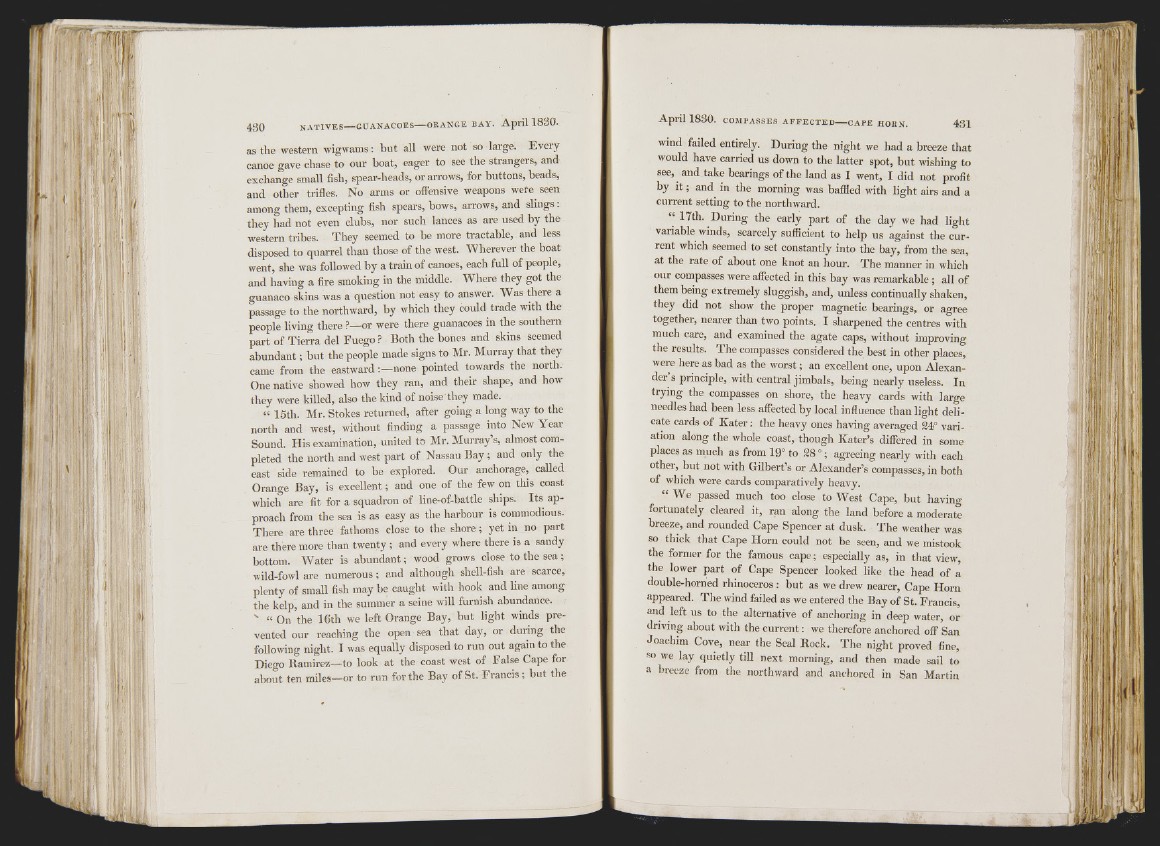
' ' J
. I ’i
1 M,!
as the western wigwams: but aU were not so large. Every
canoe gave chase to our boat, eager to see the strangers, and
exchange small fish, speai'-heads, or arrows, for buttons, beads,
and other trifles. No arms or offensive weapons were seen
among them, excepting fish spears, bows, arrows, and slings:
they had not even clubs, nor such lances as are used by the
western tribes. They seemed to be more tractable, and less
disposed to quarrel than those of the west. AVherever the boat
went, she was followed by a train of canoes, each full of people,
and having a fire smoking in the middle. Where they got the
guanaco skins was a question not easy to answer. Was diere a
passage to the northward, by which they could trade with the
people living there ?—or were there guanacoes in the southern
part of Tierra del Fuego? Both the bones and skins seemed
abundant; but the people made signs to Mr. Murray that they
came from the eastward -.—none pointed towards the north.
One native showed how they ran, and their shape, and how
they were kiUed, also the kind of noise they made.
“ 15th. Mr. Stokes returned, after going a long way to the
north and west, without finding a passage into New Year
Sound. His examination, united to Mr. Murray’s, almost completed
the north and west part of Nassau Bay ; and only the
east side remained to be explored. Our anchorage, called
Orange Bay, is excellent; and one of the few on this coast
which are fit for a squadron of line-of-battle ships. Its approach
from the sea is as easy as the harbour is commodious.
There are three fathoms close to the shore; yet in no part
are there more than twenty ; and every where there is a sandy
bottom. Water is abundant; wood grows close to the sea ;
wild-fowl are numerous; and although shell-fish are scarce,
plenty of small fish may be caught with hook and line among
the kelp, and in the summer a seine will furnish abundance.
' “ On the 16th we left Orange Bay, but light winds prevented
our reaching the open sea that day, or during the
following night. 1 was equally disposed to run out again to the
Diego Ramirez—to look at the coast west of False Cape for
about ten miles—or to run for the Bay of St. Francis ; but the
431
wind failed entirely. During the night we had a breeze that
would have carried us down to the latter spot, but wishing to
see, and take bearings of the land as 1 went, 1 did not profit
by i t ; and in the morning was baffled with light airs and a
current setting to the northward.
“ 17th. During the early part of the day we had light
variable winds, scarcely sufficient to help us against the current
which seemed to set constantly into the bay, from the sea,
at the rate of about one knot an hour. The manner in which
our compasses were affected in this bay was remarkable ; all of
them bring extremely sluggish, and, unless continually shaken,
they did not show the proper magnetic bearings, or agree
together, nearer than two points. 1 sharpened the centres with
much care, and examined the agate caps, without improving
the results. The compasses considered the best in other places,
were here as bad as the worst; an excellent one, upon Alexander
s principle, with central jimbals, being nearly useless. In
trying the compasses on shore, the heavy cards with large
needles had been less affected by local influence than light delicate
cards of Kater; the heavy ones having averaged 24° variation
along the whole coast, though Kater’s differed in some
places as much as from 19° to 28 ° ; agreeing nearly with each
other, but not with Gilbert’s or Alexander’s compasses, in both
of which were cards comparatively heavy.
“ We passed much too close to West Cape, but having
fortunately cleared it, ran along the land before a moderate
breeze, and rounded Cape Spencer at dusk. The weather was
so thick that Cape Horn could not be seen, and we mistook
the former for the famous cape; especially as, in that view,
the lower part of Cape Spencer looked like the head of a
double-horned rhinoceros ; but as we drew nearer, Cape Horn
appeared. The wind failed as we entered the Bay of St. Fi-ancis,
and left us to the alternative of anchoring in deep water, or
driving about with the current: we therefore anchored off San
Joachim Cove, near the Seal Rock. The night proved fine,
so we lay quietly till next morning, and then made sail to
a breeze from the northward and anchored in San Martin
fi'1
If til